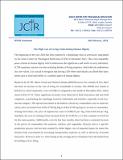The High Cost of Living Undermining Human Dignity
Date
2024-01-06Author
Muyebe, Alex S.J
Type
StatementLanguage
enItem Usage Stats
108
views
views
33
downloads
downloads
Abstract
Based on the JCTR’s Basic Needs and Nutrition Basket (BNNB) survey for a family of five, there has been an increase in the cost of living for households in Lusaka. The BNNB now stands at K9,555.53, which represents a rise of K398.12 compared to the month of December 2023, which stood at K9,157.41. These significant increases were observed in both food prices and non-food categories, exacerbating the challenges faced by individuals and families, especially in the low- income category. The upward movement in the basket is driven by commodities such as charcoal, whose price increased from K391.67/90 kg bag to K461.67/90 kg bag on account of seasonality. Among food items, the price of kapenta has risen to K308.25 per 1kg, from K245.44 per 1kg. Similarly, the cost of cooking oil has increased from K115.00 for a 2.5 litre container to K125.42 for the same quantity. Additionally, over the last four months, there has been a sustained increase in the prices of commodities like potatoes, chicken, and vegetables. Directly tied to a specific production process, this has been marked by either higher cost of imported inputs for items like chicken feed, exacerbated by increasing transportation expenses as well as driven by increased fuel prices. However, there is a silver lining as the average prices of bananas have decreased from K16.28/kg to K15.16/kg.
Description
Based on the Church’s Social Teaching (CST) which provides the basis of our foundational values at JCTR such as social justice, preferential option for the poor and the common good, it becomes evident that the issue of escalating living costs transcends mere numbers. The suffering caused by the rising cost of living goes to the core of an individual’s sense of self-worth and questions our commitment as a nation to improving the livelihoods of the poor as spelt out in the 8th National Development Plan. We have witnessed how moments of crisis like Coronavirus (COVID-19) and the cholera epidemic exacerbate pre-existing inequalities, pushing already struggling communities to a far worse position. The significance of prices for goods cannot be overstated, as they directly affect families' access to basic essentials. These families often find themselves grappling with difficult choices, having to decide between putting food on their tables and addressing other urgent necessities. This predicament creates hardship and undermines the dignity of individuals, as they are denied their right to lead fulfilling lives that honour their value and that enable them to thrive.
